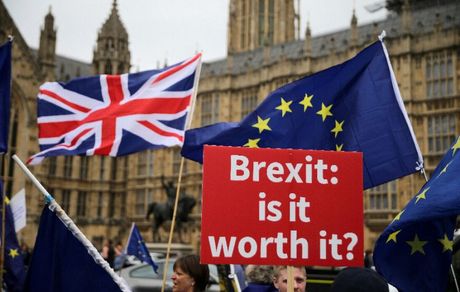EU Turns Page on Brexit and Moves on to Trade Talks

A resolute European Union sought Friday to turn the page on Brexit and move on to negotiating a looser, less favorable trading relationship with its departing British partner.
Chief EU negotiator Michel Barnier will present his draft negotiating directives to the media on Monday as Brussels prepares to take a tough stance on defending its single market.
"We want to have the best possible relationship with the United Kingdom, but it will never be as good as membership," European Commission president Ursula von der Leyen said.
"Our union has gained political impetus and has become a global economic powerhouse," she said, just hours before the British flag was due to be lowered outside the European Parliament.
British Prime Minister Boris Johnson's government has made it clear that Brexit means it will be free to diverge from EU laws on goods standards, working practices and the environment.
But European Union leaders warn that the more Britain moves away from EU regulations, the less access it will have to the bloc's huge market of around 440 million consumers.
Britain is the European Union's second biggest economy, the second biggest net contributor to the European Commission budget and represents more than 15 percent of the bloc's total GDP.
Nevertheless, while the messy divorce is a blow to EU prestige, the remaining 27 members remain by far the bigger commercial power.
- 'Law of the jungle' -
Johnson's negotiators may hope to exploit divisions between the remaining 27 member states to push Brussels into a favorable deal, but EU leaders insist unity will be their strength.
Appearing with EU Council President Charles Michel and European Parliament speaker David Sassoli, Von der Leyen expressed the now standard nostalgic lines of regret about the UK decision.
But all three, having met the day before at a country retreat to ensure the EU institutions were singing from the same hymn sheet, were clear that Britain can not have its cake and eat it.
"On Monday, we will open a new page in our history," von der Leyen, the former German defence minister, said. "The Commission will present its position for the negotiations.
"We want the best partnership possible with the United Kingdom but it's clear that there will always be a difference. Being a member of the European Union counts. There is strength in a union."
London understands this, as senior British minister Michael Gove told the BBC on Friday.
"We want trade to be as frictionless as possible, but the EU is clear -- you can only have fully frictionless trade if you accept all their rules, you accept all their laws," Gove said.
"But we voted to be independent."
In Brussels, Sassoli, an Italian socialist, warned that there are "forces trying to weaken the European Union" and said Brexit should be an occasion to strengthen the bloc's core values.
"We are the largest economy in the world," the leader of the European Parliament declared, warning of "those who want to divide us because they're afraid of a rule-governed world."
"There is an obsession that has been rammed home to us by our British friends -- and we're grateful to them for this -- we want proper rules to govern this European dimension," he explained.
"Because rules allow you to live better -- and you can defend the more vulnerable when you have rules. But when you have an absence of rules it's the law of the jungle -- might becomes right."
Johnson is also expected to announce his government's negotiating agenda next week, perhaps -- like Barnier -- as early as Monday.
But if a new trade deal is to be agreed it will have to be done in record time -- the post-Brexit "standstill" period when the rules remain the same will expire in 11 months.
- 'Existential threat' -
After that, on January 1 next year, Britain could be out of Europe and trading on WTO rules, facing tariff and regulatory barriers between its firms and its nearest neighbors.
Some EU capitals are aware of that threat. Irish Prime Minister Leo Varadkar warned Friday that a failure to reach deal by the deadline would pose an "existential threat" to his economy.
But Europe will not let just anything go to secure a deal. France, Denmark and the Netherlands -- among others -- will drive a hard bargain on access to Britain's fishing waters.
Germany is concerned for its motor industry, Spain is watching the situation in Gibraltar closely and many share Dublin's concern over border controls between Ireland and Northern Ireland.
Britain wants, Gove said, a free trade deal like Canada has with the EU -- one that took eight-and-a-half years to negotiate. It may have to settle for a "bare bones" arrangement on goods tariffs.



